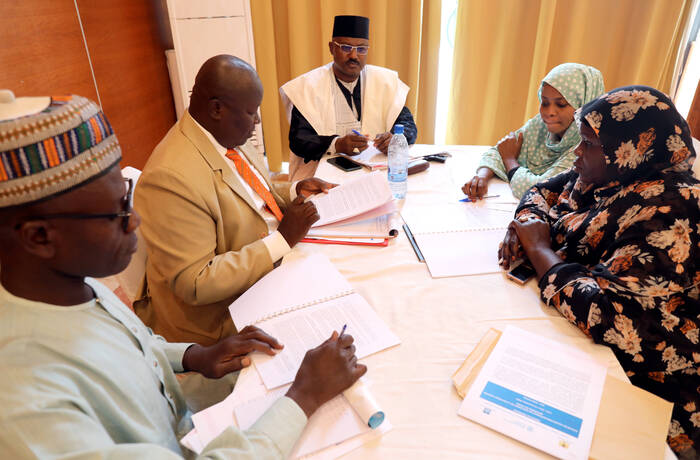Other articles
Sierra Leone embraces a Human Rights Based approach to land governance assessment
FAO and Partners advancing Inclusive Land reforms at the 2023 African Land Policy Conference
FAO supported the National Forum on Land Tenure in Cotonou
FAO supports the launch of the Pacific Land Network (PLaNet)
Chad validates its National Land Policy
Towards an inclusive land reform in Mauritania
More secure land tenure in Senegal lays the groundwork for agroecology and women empowerment
FAO supports a historic land tenure forum in Guinea
Land Tenure and Sustainable Agri-Food Systems
Open Tenure Trainings with UN-REDD in RDC and Colombia
Geospatial Information for Digital Transformation conference, 27-29 October, Oslo
Land tenure continues to be major objective of development agenda
Mainstreaming VGGT in revision of 2013 Land Law in Viet Nam for more responsible tenure governance
Passage of long-awaited tenure reform in Niger
Sharing land law knowledge in Southeast Asia
What COVID movement restriction means for nomadic pastoralists in the Sahel
Chinese investments in agricultural land in Africa
Land governance in Colombia's protected areas
ECOWAS embraces the Voluntary Guidelines
Chad validates its National Land Policy

- FAO/Ingeborg Gaarde. Opening ceremony. National validation workshop of the Land Policy in N’djamena, Chad,10 November 2023.
On 11 November 2023, national stakeholders validated the National Land Policy in Chad. The validation workshop brought together the multi-stakeholder committee in charge of preparing the land policy and revision of the land code.
The committee is presided by the Ministre de l’Aménagement du Territoire, de L’Urbanisme et de l’Habitat and composed of key ministers, civil society, peasants and pastoralist organizations, women and youth representatives and traditional chiefs. Representatives from all regions from all over the country were also invited to participate in the validation workshop.
The Minister of water and sanitation, who opened the workshop on behalf of the Minister of Land Planning, Urban Development and Housing underlined that the land policy is an important achievement for Chad, as it defines a common vision and gives clear orientations for land governance in the country.
The Minister also informed that H.E. General Mahamat Idriss Déby Itno, President of the transition and Head of State of the Republic of Chad, has decided to prioritize strong actions for improved land governance in the transition roadmap; and that the land policy document is expected to help to consolidate peace and social cohesion in the county.
The President of High Council of traditional chiefdoms in Chad underlined in his speech that the fact that more than 80 percent of the conflicts that end at the court level in Chad are related to land; and that the land policy has been long awaited to find appropriate solutions to these pressing challenges.
The validation workshop was organized by FAO, with financial contribution from the Land-at-scale project funded by the Netherlands Ministry of Foreign Affairs and OXFAM supporting capacities of civil society actors to actively engage in the land reform process in Chad.

- FAO/Ingeborg Gaarde. A group work session on the land Policy document led one of the Traditional chiefs in N’Djamena, Chad,10 November, 2023.
The validation of the land policy was the culmination the participatory process of preparing the land policy in Chad during which a long series of consultations have been undertaken in three different agro-ecological zones of Chad.
The inclusive reform process in Chad is inspired by the Voluntary Guidelines on the Responsible Governance of Tenure of Land, Fisheries and Forests (VGGT) and the Framework and Guidelines on Land Policy in Africa.
Next step will be the preparation of the land policy action plan, adoption and implementation.
